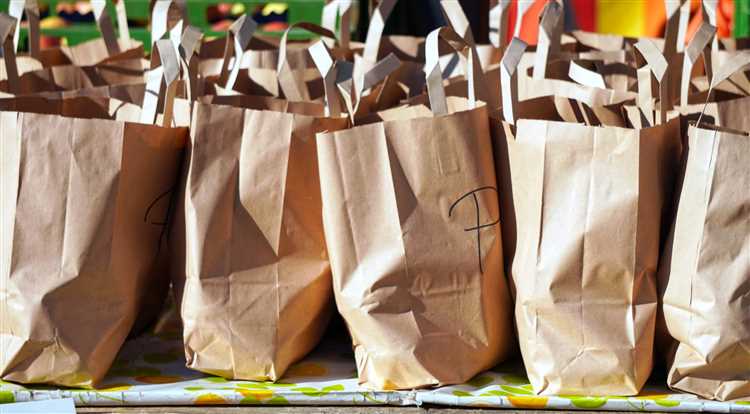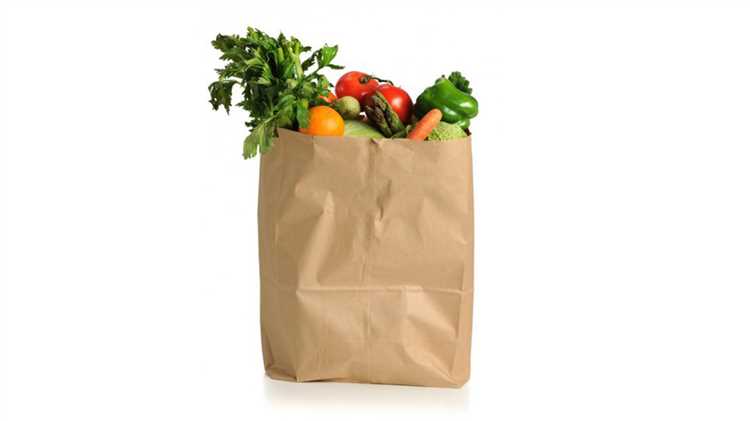
Paper bags have long been a popular choice in supermarkets for carrying groceries. They are an environmentally friendly alternative to plastic bags, as they are biodegradable and can be easily recycled. This makes them a more sustainable option, reducing the amount of waste that ends up in landfills and pollutes our planet.
One of the advantages of paper bags is their sturdiness. They are generally stronger and can hold more weight than plastic bags, making them a reliable option for carrying heavy items. Moreover, paper bags are breathable, which is particularly beneficial for perishable goods like fruits and vegetables. The breathability helps to maintain the freshness of these products and prevent them from spoiling quickly.
Another advantage of paper bags is their versatility. They come in various sizes and shapes, making them suitable for different types of items. Whether it’s a small bag for a few items or a larger one for bulk purchases, paper bags can accommodate the needs of the customers. Furthermore, paper bags can be easily customized with branding and printing, allowing supermarkets to promote their logo or advertise special offers.
However, paper bags also have their disadvantages. One of the main concerns is their durability. Unlike plastic bags, paper bags can tear or get wet easily, especially when carrying heavy or wet items. This can be inconvenient for customers, as it may lead to the loss of groceries or even damage other items they have purchased.
Additionally, paper bags consume more resources during production compared to plastic bags. The process of manufacturing paper bags requires cutting down trees and consuming water and energy. While paper bags are biodegradable and can be recycled, the resources used to produce them still have an impact on the environment. Plastic bags, on the other hand, are made from petroleum, a non-renewable resource, but they require less energy and water to produce.
In conclusion, paper bags have several advantages, such as being environmentally friendly, sturdy, and versatile. However, their durability and resource consumption during production should be considered as disadvantages. Supermarkets should weigh the pros and cons and choose the type of bag that best suits their customers’ needs and aligns with their sustainability goals.
- The Pros and Cons of Paper Bags in Supermarkets
- Advantages of Paper Bags
- Disadvantages of Paper Bags
- Environmental Benefits of Paper Bags
- Biodegradability and Recycling
- Strength and Durability of Paper Bags
- Cost and Production Considerations
- Potential Health Risks
- Chemical Contamination
- Bacterial Growth
- Consumer Preferences and Market Trends
- Market Trends
- Question-answer:
- What are some advantages of using paper bags in supermarkets?
- Are there any disadvantages of using paper bags in supermarkets?
- Can paper bags be reused?
- What are the alternatives to paper bags in supermarkets?
The Pros and Cons of Paper Bags in Supermarkets
Paper bags have long been a staple in supermarkets, but as more and more environmental concerns arise, their use is being questioned. Here, we will weigh the advantages and disadvantages of using paper bags in supermarkets.
Advantages of Paper Bags
1. Biodegradable: One of the biggest advantages of paper bags is that they are biodegradable. Unlike their plastic counterparts, paper bags can break down naturally over time, reducing their impact on the environment.
2. Renewable Resource: Paper bags are made from trees, which are a renewable resource. As long as forests are managed sustainably, the production of paper bags has a minimal impact on our natural resources.
3. Versatility: Paper bags can be used for a wide range of purposes, not just carrying groceries. They can be reused as lunch bags, storage bags, or even for arts and crafts projects, making them a versatile option.
Disadvantages of Paper Bags
1. Durability: Compared to plastic bags, paper bags are less durable and can tear or break more easily. This can be a disadvantage when carrying heavy or sharp items.
2. Water Consumption: The production of paper bags requires a significant amount of water. This can put a strain on water resources, especially in areas prone to droughts.
3. Carbon Footprint: While paper bags are biodegradable, their production still contributes to carbon emissions. The manufacturing process, transportation, and disposal of paper bags all have an impact on the environment.
Ultimately, the decision to use paper bags in supermarkets is a complex one. While they have benefits such as being biodegradable and made from renewable resources, they also have drawbacks in terms of durability and environmental footprint. Supermarkets should carefully consider all factors before deciding on the best packaging option for their products.
Environmental Benefits of Paper Bags
One of the main advantages of using paper bags in supermarkets is their environmental benefits. Paper bags are made from renewable resources, such as trees, which can be replanted. This means that the production of paper bags has a lower carbon footprint compared to plastic bags, which are made from non-renewable resources like oil.
Another environmental benefit of paper bags is that they are biodegradable and recyclable. Unlike plastic bags, which can take hundreds of years to decompose, paper bags break down much more quickly and easily. This reduces their impact on landfills and the overall amount of waste in the environment. Furthermore, paper bags can be recycled into new paper products, reducing the demand for virgin materials and conserving resources.
In addition, paper bags have a smaller impact on wildlife compared to plastic bags. Plastic bags often end up in oceans and waterways, where they can harm marine life. Paper bags, on the other hand, are less likely to cause entanglement or ingestion by animals. While paper bags still have some environmental impacts, such as water and energy usage during production, they are generally considered more environmentally friendly than plastic bags.
Moreover, using paper bags in supermarkets can help raise awareness about the importance of sustainable alternatives to plastic. By offering paper bags as an option, supermarkets can encourage customers to make more eco-friendly choices and reduce their reliance on single-use plastic. This can contribute to a shift in consumer behavior and a greater adoption of sustainable practices.
Overall, the environmental benefits of using paper bags in supermarkets make them a more sustainable choice compared to plastic bags. From their renewable resources to their biodegradability and recyclability, paper bags have a positive impact on the environment and can help reduce plastic pollution. By promoting the use of paper bags, supermarkets can contribute to a greener and more sustainable future.
Biodegradability and Recycling
One of the main advantages of using paper bags in supermarkets is their biodegradability. Unlike plastic bags, which can take hundreds of years to decompose, paper bags are made from natural materials that can break down relatively quickly in the environment. This means that paper bags are less likely to contribute to long-term pollution and litter.
Furthermore, paper bags are also recyclable. This means that they can be collected and processed to create new paper products, reducing the need for virgin materials. The recycling process for paper bags is relatively simple and energy-efficient, making it an environmentally friendly option.
However, it’s important to note that not all paper bags are recycled. Many end up in landfill sites, where they can take up space and release greenhouse gases as they break down. To maximize the environmental benefits of using paper bags, it’s essential to promote and support recycling initiatives.
In addition, it’s worth considering the impact of the production and transportation of paper bags. The manufacturing process for paper bags can consume significant amounts of water, energy, and chemicals. Additionally, transporting paper bags from production facilities to supermarkets can result in carbon emissions.
Overall, while paper bags have the advantage of being biodegradable and recyclable, it’s important to consider their entire lifecycle and promote responsible use and disposal to minimize their environmental impact.
Strength and Durability of Paper Bags
Paper bags have long been used as a popular alternative to plastic bags in supermarkets. One of the key advantages of using paper bags is their strength and durability. Despite their lightweight appearance, paper bags are capable of holding a significant amount of weight.
Unlike plastic bags, which can tear or break under pressure, paper bags are less likely to tear and are more durable. This is especially important when carrying heavy groceries or items in the supermarket. Paper bags are designed to withstand the stresses of transportation and ensure that the contents remain intact.
Paper bags are also more resistant to moisture compared to plastic bags. While plastic bags can become weak and brittle when exposed to moisture, paper bags retain their strength even when they come into contact with damp conditions. This makes them a reliable option for carrying groceries, especially in situations where there might be spills or leaking items.
Furthermore, paper bags can be reused multiple times. They are strong enough to withstand repeated use, which makes them a more sustainable option compared to single-use plastic bags. Users can fold them up and store them for future trips to the supermarket, reducing the need for new bags each time.
However, it’s important to note that paper bags are not as durable as reusable fabric bags or certain types of plastic bags. They may not be suitable for carrying extremely heavy or sharp items, as they can tear or puncture. Additionally, they may not hold up well in wet or rainy conditions, as excessive moisture can weaken the paper. But overall, paper bags offer a good balance of strength and durability for everyday supermarket use.
Cost and Production Considerations
When considering the use of paper bags in supermarkets, it is important to take into account the cost and production aspects. While paper bags may seem like a more affordable and environmentally friendly option compared to plastic bags, there are various factors that contribute to the overall cost and production of these bags.
- Raw Materials: Paper bags are made from wood pulp obtained from trees. The cost of raw materials, such as hardwood or softwood, can significantly impact the production cost of paper bags.
- Manufacturing Process: The production of paper bags involves several steps, including pulping, bleaching, drying, and shaping. Each step requires energy, water, and machinery, which contribute to the overall production cost.
- Printing and Design: Companies often customize paper bags with their logo or artwork, which adds to the production cost. The complexity of the design and the number of colors used can also affect the overall cost.
- Transportation: Paper bags can be bulky and take up more space compared to plastic bags, resulting in increased transportation costs. The weight of paper bags can also impact fuel consumption during transportation.
- Strength and Durability: Paper bags have a limited strength and durability compared to plastic bags. This can lead to an increased risk of tearing or damage during transportation and use, resulting in additional production and replacement costs.
While the production cost of paper bags may be higher than plastic bags, their eco-friendly nature and biodegradability make them a preferred choice for many supermarkets. However, it is essential to consider all the cost and production factors before making a decision.
Potential Health Risks
While paper bags are generally considered a more eco-friendly alternative to plastic bags, they still present potential health risks. One of the main concerns is the presence of harmful chemicals in the production process of paper bags.
Chemical Contamination

During the manufacturing of paper bags, various chemicals may be used, such as dyes, adhesives, and bleaches. Some of these chemicals can leave residues on the bags, which could potentially contaminate the products or food items stored inside. Packaging materials that come into contact with food should meet strict safety standards to ensure there is no risk of chemical migration.
Bacterial Growth
Another health risk associated with paper bags is the potential for bacterial growth. When paper bags come into contact with moisture, such as spills or wet produce, they can become a breeding ground for bacteria. If not properly stored or handled, these bags can transfer harmful bacteria to the items they are carrying, posing a risk to consumers.
Furthermore, reusable paper bags need to be washed regularly to prevent bacterial contamination. If these bags are not properly cleaned, they can harbor bacteria and potentially cause foodborne illnesses.
| Potential Health Risks of Paper Bags | Precautions |
|---|---|
| Chemical contamination | Ensure packaging materials meet safety standards |
| Bacterial growth | Properly handle and store paper bags, wash reusable bags regularly |
It is important for consumers and supermarkets to be aware of these potential health risks associated with paper bags. Proper precautions should be taken to mitigate any potential harm and ensure the safety of both the products being stored in the bags and the consumers who use them.
Consumer Preferences and Market Trends
Consumer preferences and market trends play a significant role in the choice between paper bags and other alternatives in supermarkets. Understanding these preferences and trends is crucial for supermarkets to meet the demands of their customers and stay competitive in the market.
One of the main factors driving consumer preferences is the increasing focus on sustainability and environmental consciousness. Many consumers are becoming more aware of the negative impacts of plastic bags on the environment, including their contribution to pollution and marine life damage. As a result, there is a growing demand for eco-friendly packaging options like paper bags.
Another trend that influences consumer preferences is the rise of reusable bags. Reusable bags are seen as a more sustainable choice compared to single-use bags, including paper bags. Many consumers now bring their own reusable bags when shopping, reducing the need for supermarkets to provide bags altogether.
However, it is important to note that consumer preferences can vary depending on region and demographics. While some consumers may prioritize sustainability and opt for paper bags, others may prioritize convenience and choose plastic or other alternative bags.
Market Trends

- Increasing demand for eco-friendly packaging options
- Rise of reusable bags as a more sustainable choice
- Varied consumer preferences based on region and demographics
Supermarkets need to stay updated on these market trends and consumer preferences to make informed decisions about the types of bags they offer. By understanding and catering to these preferences, supermarkets can attract environmentally-conscious consumers and differentiate themselves from competitors.
Question-answer:
What are some advantages of using paper bags in supermarkets?
There are several advantages of using paper bags in supermarkets. Firstly, paper bags are biodegradable and can be easily recycled, which makes them an environmentally friendly option. Secondly, paper bags are sturdy and can hold a large amount of groceries, reducing the need for double bagging. Lastly, paper bags are often cheaper to produce than plastic bags, making them a cost-effective choice for supermarkets.
Are there any disadvantages of using paper bags in supermarkets?
Yes, there are some disadvantages of using paper bags in supermarkets. Firstly, paper bags are not as durable as plastic bags, so there is a higher chance of them tearing or getting wet. Secondly, the production of paper bags requires more energy and resources compared to plastic bags, which can have a negative impact on the environment. Lastly, paper bags take up more space than plastic bags, both during transportation and storage.
Can paper bags be reused?
Yes, paper bags can be reused multiple times. They can be used for various purposes, such as carrying groceries, packing items for storage, or even as gift bags. However, it is important to note that the durability of paper bags decreases with each use, so they might not be as sturdy as before.
What are the alternatives to paper bags in supermarkets?
There are several alternatives to paper bags in supermarkets. One common alternative is the use of reusable cloth bags, which can be used multiple times and are more durable than paper bags. Another alternative is the use of biodegradable plastic bags, which have a lower impact on the environment compared to traditional plastic bags. Some supermarkets also offer the option of using customers’ own bags or containers for packaging groceries.